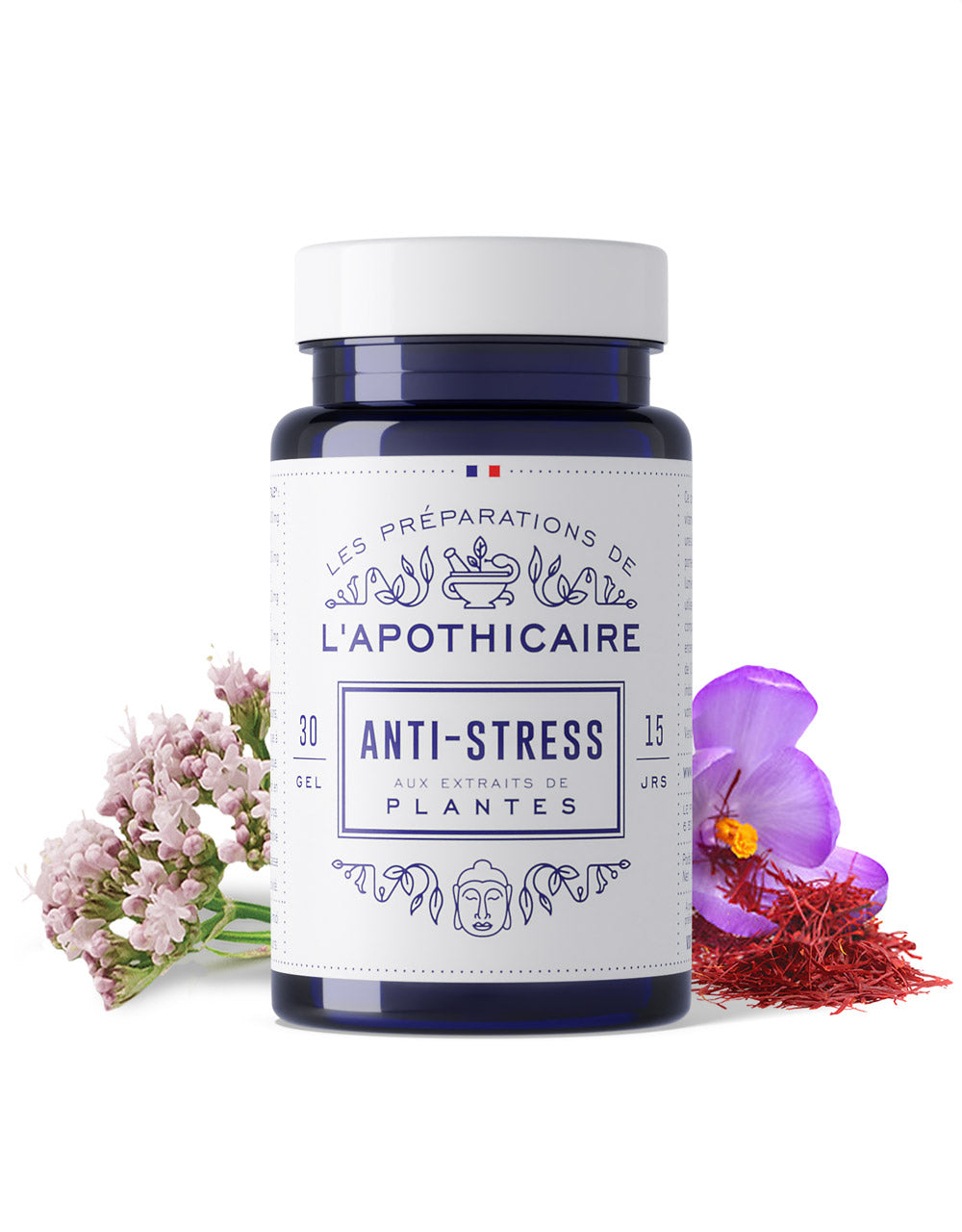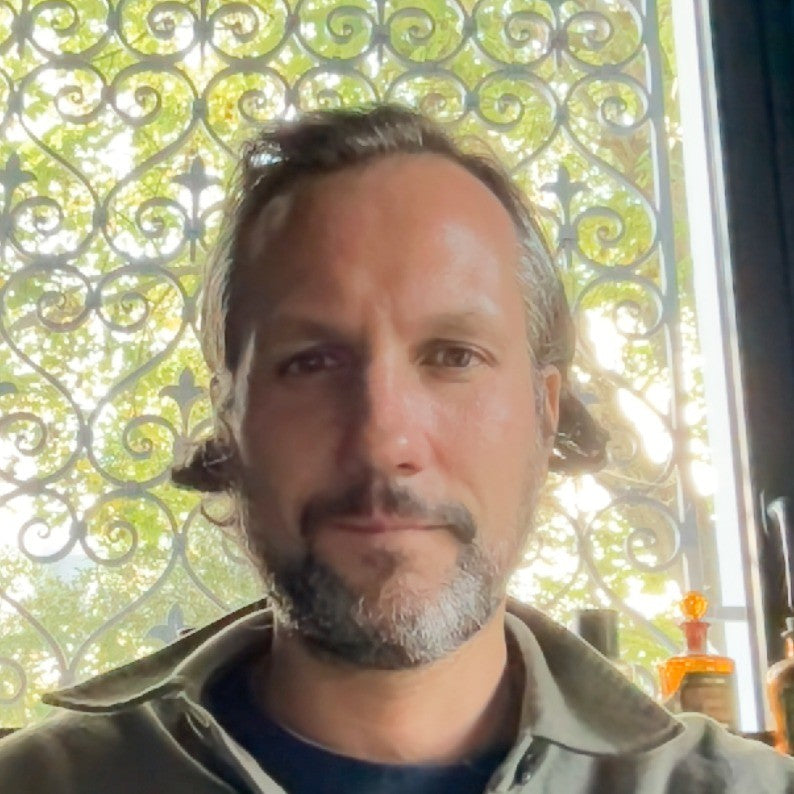Anxiety has become a frequent companion in our lives, impacting our daily well-being and quality of life. If you often feel stressed, agitated or constantly worried, know that you are not alone and that natural solutions exist. In this article, we present six natural remedies for anxiety that combine ancestral traditions and modern approaches to help you find serenity and balance.
- Symptoms and causes of anxiety
- Anxiety Remedy #1: Calming Herbal Remedies
- Anxiety Remedy #2: Dietary Supplements
- Anxiety Remedy #3: Aromatherapy
- Anxiety Remedy #4: Relaxation Techniques
- Anxiety Remedy #5: Lifestyle Adjustments
- Anxiety Remedy #6: Alternative Therapies
Symptoms and causes of anxiety
Causes of Anxiety
Anxiety often results from a complex interaction between various biological, psychological and environmental factors:
- Biological factors: Chemical imbalances in the brain, particularly in neurotransmitters such as serotonin, dopamine, and GABA , can contribute to the development of anxiety. Additionally, a family history of anxiety or other mental disorders increases the risk of developing this condition.
- Psychological factors: Stressful life experiences, such as trauma, abuse, significant loss, or periods of prolonged stress, can trigger or exacerbate anxiety. Negative thought patterns, such as rumination or perfectionism, also play a significant role.
- Environmental factors: An unstable living environment, conflicting interpersonal relationships, professional or academic pressures, and major life events (such as moving, a career change, or a separation) can be triggers for anxiety.
- Lifestyle factors: An unbalanced diet, lack of exercise, excessive caffeine or alcohol consumption, and irregular sleep patterns can also contribute to the development or worsening of anxiety.

Symptoms of Anxiety
Symptoms of anxiety can vary in intensity and manifestation among individuals, but they generally fall into several categories:
- Physical symptoms: People with anxiety may experience heart palpitations, trembling, excessive sweating, chest pain, headaches, muscle tension, digestive upsets such as nausea or diarrhea, and a feeling of persistent fatigue. These physical symptoms are often due to activation of the sympathetic nervous system, which is responsible for the “fight or flight” response.
- Psychological symptoms: Anxiety can cause constant worry, intrusive thoughts, difficulty concentrating, feeling nervous or agitated, and excessive anticipation of future problems. These symptoms may also include sleep disturbances , such as insomnia or frequent awakenings during the night.
- Behaviors: Some people may engage in avoidance behaviors to escape situations they perceive as stressful or threatening. This can include reduced social interactions, decreased work or academic performance, and increased reliance on substances such as alcohol or medications to try to manage their anxiety.
Fortunately, anxiety can be reduced with a few solutions. We offer you 6 remedies to fight against anxiety. Be careful, consulting a doctor is necessary if your anxiety is not relieved with these tips .
Anxiety Remedy #1: Calming Herbal Remedies
Valerian
Valerian ( Valeriana officinalis ) is one of the most popular herbs for combating anxiety and sleep disorders. It acts as a natural sedative by increasing levels of GABA (gamma-aminobutyric acid) in the brain, a neurotransmitter that promotes relaxation and reduces nervous excitability. Valerian is often used in the form of herbal teas. It is particularly recommended in the evening to help improve sleep quality and reduce symptoms of anxiety.
Passionflower
Passionflower ( Passiflora incarnata ) is another herb widely used for its anxiolytic effects. It helps reduce anxiety by regulating the activity of the central nervous system. Passionflower is also beneficial for relieving muscle tension and promoting relaxation. It is usually found in infusion or tablets. It is ideal for daily use to maintain reduced stress levels and better anxiety management.
Lemon balm
Lemon balm ( Melissa officinalis ) has calming and antispasmodic properties. It is effective in soothing the nervous system, reducing stress and improving mood. Lemon balm is often consumed as a herbal tea or used as a diluted essential oil for massages. In addition to its relaxing properties, it promotes better digestion, which can be beneficial in cases of stress-related digestive disorders.

Chamomile
Roman chamomile ( Chamaemelum nobile ) is known for its calming and sedative effects. It is particularly useful for reducing anxiety, promoting relaxation and improving the quality of sleep. Roman chamomile can be consumed as an infusion or in tablets. Its sweet scent and anti-inflammatory properties make it a valuable ally for calming the mind and relaxing the body.
Lavender
Lavender ( Lavandula angustifolia ) is widely used in aromatherapy for its relaxing and anxiolytic properties. Its soothing scent helps reduce stress and anxiety, and it promotes restful sleep. Lavender can be used by atmospheric diffusion, direct inhalation, or diluted in a carrier oil for massage. It is also available in capsule or tincture form for internal use, although the latter method should be used with caution and under medical advice.
Warning! Although these plants are natural, it is important to use them with caution. Some may interact with medications or may not be suitable for certain health conditions. It is recommended to consult a healthcare professional before starting any supplementation, especially if you are pregnant, breastfeeding or taking medication. In addition, respecting the recommended dosages is essential to avoid any adverse effects.
Anxiety Remedy #2: Dietary Supplements
B vitamins
B vitamins play a role in maintaining the health of the nervous system. Among them, vitamin B6 (pyridoxine ) is particularly important because it participates in the synthesis of neurotransmitters such as serotonin and dopamine (which regulate mood and promote a feeling of well-being). A deficiency in B vitamins can lead to increased stress, anxiety and mood disorders.
B vitamins are found naturally in foods such as meats, fish, eggs, dairy products, legumes and whole grains .
However, in times of intense stress or for those following a restrictive diet, supplementation may be beneficial. It is important to respect the recommended doses and to consult a healthcare professional before starting a supplement, in order to avoid any imbalance or interaction with other medications.
Omega-3
Omega -3s are essential fatty acids known for their anti-inflammatory properties and ability to reduce stress. They play an important role in brain health by helping to build neuronal cell membranes and facilitating communication between nerve cells.
Studies have shown that omega-3s can help reduce symptoms of anxiety and depression, improving mood and promoting greater resilience to stress . Top sources of omega-3s include oily fish such as salmon, mackerel, and sardines, as well as flaxseed, canola, and chia seeds. For those who do not regularly consume these foods, fish oil or krill oil supplements may be an effective alternative. It is important to choose high-quality supplements that are free of contaminants and to consult a healthcare professional, especially if you are taking blood thinners, as omega-3s can increase the risk of bleeding at high doses.

Magnesium
Magnesium is an essential mineral that plays a key role in regulating nerve transmission and muscle relaxation.
It helps maintain neurotransmitter balance and reduce the production of the stress hormone cortisol . A magnesium deficiency can manifest itself through symptoms such as nervousness, irritability, fatigue, and sleep disturbances. Food sources rich in magnesium include leafy green vegetables, nuts, seeds, whole grains, and dark chocolate.
For those who are unable to get enough magnesium from their diet, magnesium supplements (such as magnesium citrate or magnesium bisglycinate) may be considered. It is important to choose a form of magnesium that is well absorbed and not to exceed the recommended doses, as excess can cause side effects such as diarrhea.
Rhodiola
Rhodiola is an adaptogenic herb known for its ability to help the body adapt to emotional and physical stress. It improves stress resistance, reduces mental fatigue, and promotes better concentration . It is especially beneficial for people who face prolonged stressful situations, as it helps maintain hormonal balance and reduce cortisol levels.

Combined with saffron and vitamin B6, as in our anti-stress capsules, rhodiola offers a powerful synergy to combat stress and anxiety naturally and effectively.
Discover the anti-stress capsules!Saffron
Saffron is a spice that has anxiolytic and antidepressant properties. Studies have shown that saffron can improve mood and reduce symptoms of anxiety due to its active compounds, such as crocin and safranal , which influence neurotransmitters in the brain. It is known for its ability to increase serotonin levels, which contributes to better mood regulation and reduced anxiety .
Warning! Always follow the recommended doses to avoid side effects and drug interactions. A balanced and personalized approach, in agreement with your pharmacist or doctor, will allow you to fully benefit from the benefits of these food supplements in the management of anxiety.
Anxiety Remedy #3: Aromatherapy
Aromatherapy uses essential oils extracted from plants to promote physical and emotional well-being. This ancient method, known for its calming properties, can be easily incorporated into your daily routine to reduce stress and promote relaxation.
Among the many essential oils available, some stand out for their relaxing and anxiolytic properties:
- True lavender ( Lavandula angustifolia ) : known for its calming effects, lavender helps reduce stress, anxiety and promotes restful sleep. It can be diffused in the air or applied diluted to the skin during relaxing massages.
- Bergamot ( Citrus bergamia ) : This citrusy essential oil is known to improve mood and reduce feelings of depression and anxiety. It is ideal for diffusion or direct inhalation.
- Roman chamomile ( Chamaemelum nobile ) : Valued for its soothing properties, Roman chamomile helps calm the mind and ease nervous tension. It can be used in diffusion or diluted topical application.
- Ylang-ylang ( Cananga odorata ) : With its captivating floral scent, ylang-ylang is effective in reducing stress and promoting relaxation. It is often used in diffusion or added to massage oil blends.
- Clary Sage ( Salvia sclarea ) : This essential oil is known for its balancing properties on the nervous system, helping to reduce anxiety and improve mental clarity. It can be diffused or applied in small amounts to the skin, always diluted.

Aromatherapy can be practiced in several ways. Atmospheric diffusion disperses essential oils into the air, creating a relaxing atmosphere in your living space. Direct inhalation, by placing a few drops on a handkerchief or in the palms of your hands, offers rapid relief in the event of occasional stress. Skin application, by diluting essential oils in a neutral vegetable oil, allows you to massage specific areas such as the wrists or neck for deep relaxation.
It is important to use aromatherapy with caution. Some essential oils are contraindicated during pregnancy, breastfeeding or for young children. Additionally, consult a healthcare professional before incorporating aromatherapy if you are taking medications or have specific medical conditions.
Anxiety Remedy #4: Relaxation Techniques
Among the most commonly recommended techniques, yoga stands out for its combination of physical postures, controlled breathing, and meditation, which helps relax the body while refocusing the mind. Mindfulness meditation is also very effective; it involves paying attention intentionally and without judgment to the sensations present, which helps reduce anxious thoughts and improve concentration.
Deep breathing exercises are another simple, yet powerful method for reducing anxiety. By practicing slow, deep breaths, you can activate the parasympathetic nervous system, which is responsible for relaxation, which lowers your heart rate and blood pressure. Progressive muscle relaxation , which involves systematically tensing and releasing different muscle groups, helps reduce physical tension built up by stress and promotes a feeling of deep relaxation.

Guided visualization is a technique where you imagine calming scenes or serene environments, helping to distract your mind from sources of stress and induce a state of tranquility. Additionally, practices such as self-hypnosis can be used to reprogram emotional responses to stress, reinforcing positive thoughts and decreasing anxious reactions.
Incorporating these relaxation techniques into your daily routine can significantly improve your stress management and reduce symptoms of anxiety. It is recommended to dedicate a few minutes each day to these practices to feel the benefits in the long term . However, if anxiety persists or significantly interferes with your daily life, it is essential to consult a health professional for personalized support tailored to your needs.
Anxiety Remedy #5: Lifestyle Adjustments
Eat a balanced diet
A healthy and balanced diet plays a very important role in regulating mood and managing stress. Avoid excess sugar and caffeine , which can exacerbate anxiety symptoms and disrupt your emotional balance. Consume foods full of magnesium, vitamins and omega 3 in particular.
Practice regular physical activity
Exercise is a powerful stress regulator. It stimulates the production of endorphins, the feel-good hormones, which help improve mood and reduce levels of the stress hormone cortisol . Incorporate moderate activities such as walking, cycling, swimming or yoga into your weekly routine. Even short 20-minute sessions a few times a week can have beneficial effects on your mental and physical health.

Ensure quality sleep
Sleep is essential for physical and mental recovery . Lack of sleep can increase sensitivity to stress and worsen anxiety symptoms. Establish a regular sleep routine by going to bed and waking up at the same time each day. Create an environment conducive to rest by avoiding screens before bed, keeping a dark and quiet bedroom, and practicing relaxation techniques as discussed above before bed.
Reduce alcohol and tobacco consumption
Alcohol and tobacco can have negative effects on your nervous system and exacerbate anxiety . Alcohol, while it may provide temporary relief, disrupts sleep and increases stress levels in the long term. Tobacco, on the other hand, stimulates the central nervous system and can intensify feelings of nervousness and irritability. Limit or eliminate these substances from your daily routine to promote greater emotional stability.
Anxiety Remedy #6: Alternative Therapies
Acupuncture
This ancient practice from traditional Chinese medicine involves inserting fine needles into specific points on the body. This method aims to rebalance the flow of energy, or "Qi", in the body, thus promoting better mental and physical health .
For anxiety, acupuncture can help reduce levels of the stress hormone cortisol and stimulate the production of endorphins, natural feel-good hormones. Many studies have shown that acupuncture can decrease symptoms of anxiety by improving relaxation and reducing muscle tension. It is essential to consult a qualified acupuncturist to ensure a safe and effective practice.

Hypnosis
This technique uses an altered state of consciousness to access the unconscious mind and change negative thought patterns. During hypnosis sessions, a hypnotherapist guides the patient through positive suggestions and visualizations that can help reduce anxiety, improve self-confidence, and promote a state of inner calm. Hypnosis can be especially beneficial for those looking to overcome phobias, obsessive-compulsive disorder, or irrational fears . While generally safe, it is recommended to work with a certified professional to maximize benefits and avoid unwanted manipulation.
EFT (Emotional Freedom Technique)
EFT is a relatively new method that combines elements of cognitive psychology with tapping techniques on specific points of the body. When practicing EFT, individuals gently tap on specific points while focusing on stressful thoughts or emotions. The technique aims to release emotional blockages and restore the body's energetic balance, thereby reducing symptoms of anxiety. EFT is valued for its simplicity and accessibility, and can be practiced alone or with the help of a certified practitioner. It is particularly useful for managing anxiety attacks, traumatic memories, or accumulated tension.
These anxiety remedies are something to consider to help you. However, if the problems persist, do not hesitate to seek help from a doctor. Anxiety disorders should not be taken lightly.







